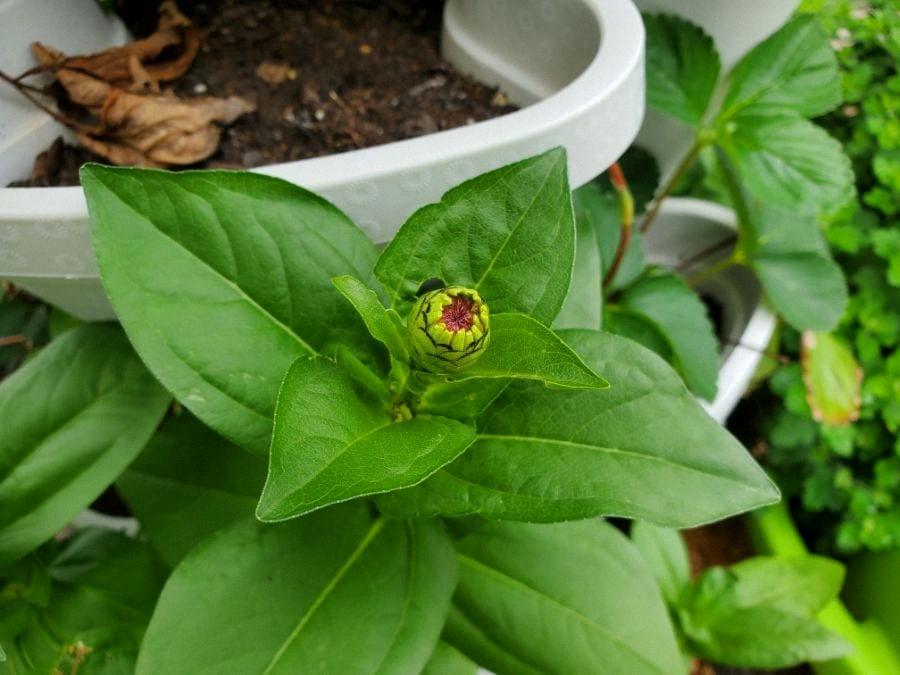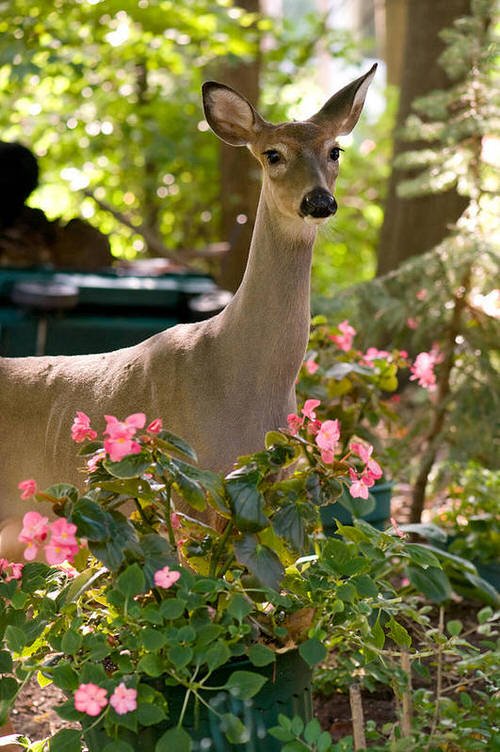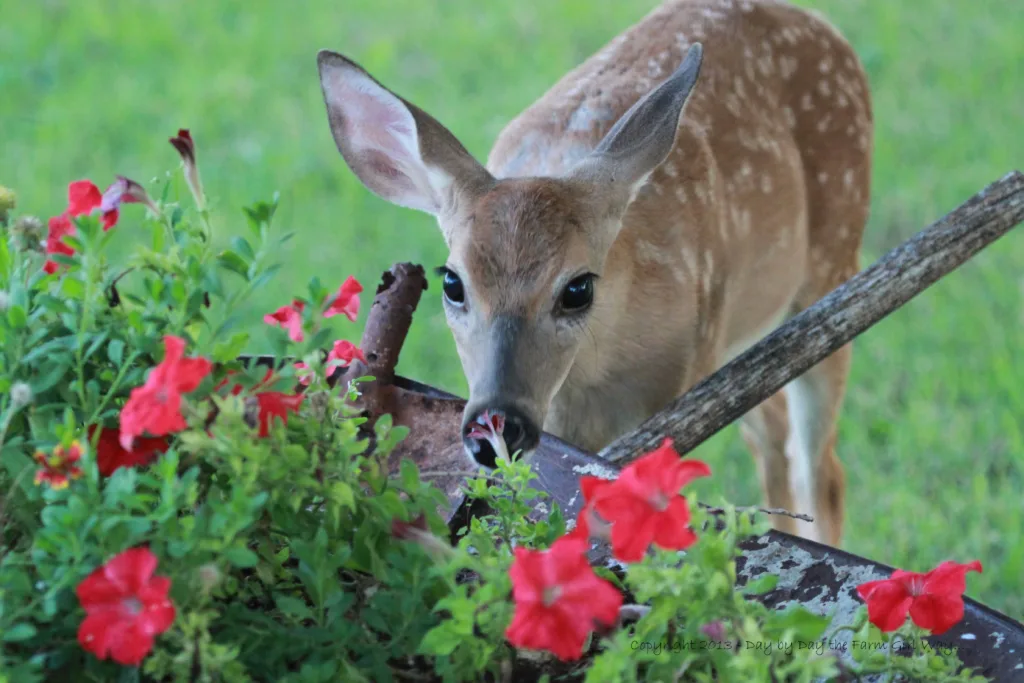Zinnias are beautiful, vibrant flowers that many gardeners enjoy planting in their gardens. They come in a variety of colors and sizes, making them a versatile addition to any garden. However, if you live in an area with a large deer population, you may be wondering if deer eat zinnias. In this blog post, we will explore whether or not deer eat zinnias and what you can do to protect your precious blooms.
First and foremost, it is important to understand that deer are opportunistic feeders. This means that they will eat almost anything if they are hungry enough. While deer typically prefer to eat grasses, leaves, and woody plants, they will also eat flowers and other ornamental plants if they cannot find other sources of food. This includes zinnias.
However, there is some good news for gardeners who love zinnias. While deer may eat zinnias if they are hungry enough, they generally do not prefer to eat them. Zinnias have a bitter taste that deer find unappealing, which means that they are not likely to be at the top of a deer’s menu.
That being said, it is still possible for deer to nibble on your zinnias, especially if they are hungry or if there are no other sources of food available. If you live in an area with a large deer population, it is important to take steps to protect your zinnias from being eaten.
One of the best ways to protect your zinnias from deer is to use deer deterrents. There are several different types of deer repellents available on the market, including sprays, granules, and electronic devices. These repellents work by either emitting a scent that deer find unappealing or by creating a loud noise that scares them away.
Another effective way to protect your zinnias from deer is to plant them alongsde other plants that deer find unappealing. For example, marigolds are a natural deer deterrent because of their strong, pungent scent. By planting marigolds alongside your zinnias, you can help to deter deer from eating your flowers.
Finally, it is important to keep your garden well-maintained and free of debris. Deer are attracted to gardens that are overgrown and cluttered, so keeping your garden tidy and well-maintained can help to deter them from coming into your yard in the first place.
While deer may eat zinnias if they are hungry enough, they generally do not prefer to eat them. If you live in an area with a large deer population, it is important to take steps to protect your zinnias from being eaten. Using deer deterrents, planting marigolds alongside your zinnias, and keeping your garden well-maintained are all effective ways to keep deer away from your precious blooms.
The Dilemma of Deer Eating Zinnias
Deer are known to be herbivores, meaning they primarily feed on plant material such as leaves, stems, and flowers. Zinnias, being a type of flower, may be attractive to deer due to their bright colors and sweet scent. Additionally, if there is a shortage of other food sources available, deer may resort to eating plants that they wouldn’t normally prefer. This could explain why your zinnias are being eaten by deer. To prevent further damage, it’s recommended to use deer deterrents and repellents to keep them away from your garden.

Source: archive.triblive.com
Do Deer Eat Marigolds and Zinnias?
Deer are known to be opportunistic feeders and will eat a wide range of plants. However, marigolds and zinnias are not typically on their menu. Marigolds, in particular, have a pungent scent that repels deer, making them a less desirable food source. Zinnias, on the other hand, are not as strongly scented, but they are still not a favored food for deer. While it is not impossible for deer to eat marigolds and zinnias, it is highly unlikely that they will do so uless they are experiencing extreme hunger and there are no other food sources available. Overall, these plants are a good choice for gardeners who want to avoid attracting deer to their gardens.
Investigating the Cause of Zinnia Damage
If you have noticed that your zinnias are being eaten, it is likely that the culprit is an insect or small animal. The most common animals that eat zinnias include aphids, caterpillars, slugs, earwigs, and beetles. Aphids are small, green insects that can be found on the underside of leaves and suck the sap out of plants. Caterpillars are the larvae of butterflies and moths, and they can chew throgh leaves and flowers. Slugs are slow-moving creatures that leave a trail of slime behind them, and they can cause damage by eating holes in the leaves. Earwigs are small insects with pinchers on their rear end, and they can also eat zinnia leaves. Beetles come in many shapes and sizes, but the most common ones that eat zinnias are Japanese beetles and cucumber beetles. If you are unsure which animal is eating your zinnias, you can inspect the plants carefully and look for signs of damage or the presence of the insects themselves.
Why Deer Avoid Eating Zinnias
Deer are known to be voracious herbivores that feed on a wide variety of plants, shrubs, and trees. However, they tend to avoid certain plants, and zinnias are one of them. Zinnias are members of the Asteraceae family, and they contain a compound called sesquiterpene lactone that gives them a bitter taste and a pungent odor. This compound is believed to be responsible for deterring deer and other herbivores from eating them.
In addition to their unpalatable taste, zinnias also have hairy leaves and stems that can be abrasive to a deer’s sensitive mouth. These hairs can cuse irritation and discomfort, making it less appealing for them to eat.
Furthermore, zinnias are not a natural part of a deer’s diet. Deer are more likely to feed on plants that are native to their habitat, and zinnias are native to Mexico and South America. So, they may not be familiar with the flower and are less likely to try it.
To sum up, the combination of zinnias’ bitter taste, hairy texture, and foreignness to a deer’s diet is why they tend to avoid eating them. This makes zinnias a safe and attractive option for gardeners who want to add color and beauty to their outdoor space without worrying about deer damage.
Flowers That Are Resistant to Deer Eating
If you’re looking for a good flower that deer won’t eat, there are several options to consider. Daffodils, foxgloves, and poppies are all common flowers that are toxic to deer, so they tend to avoid them. Another strategy is to plant flowers with strong scents that deer find unappealing. Some examples of these “stinky” flowers include sages, ornamental salvias, and lavender. Peonies and bearded irises are also known to be unappetizing to deer. So, if you want to add some color and beauty to your garden without worrying about deer munching on your flowers, consider planting these options.

Source: thepracticalplanter.com
The Best Plant to Repel Deer
There are several plants that are kown to be effective in repelling deer from your yard. One of the best plants for this purpose is the chive plant. Not only is it easy to grow and maintain, but its strong scent is known to deter deer from coming near it. Other plants that are effective in repelling deer include daffodils, lamb’s ear, bleeding heart, marigolds, Russian sage, bee balm, and oregano. These plants all have scents and textures that deer find unappealing, and they can be planted throughout your yard to create a barrier that deer are unlikely to cross. When selecting plants to repel deer, it’s important to consider the climate and soil conditions in your area to ensure that the plants will thrive and continue to provide effective protection against deer.
What is a Deer’s Favorite Flower to Eat?
Deer are knwn to be quite selective in their choice of food, and while they tend to avoid certain plants, they are particularly fond of some others. When it comes to flowers, the plantain lily, also known as Hosta spp., is a top favorite of deer. This beautiful perennial has broad, oval-shaped, soft, and juicy green leaves that are quite appetizing to deer. In fact, plantain lily is often referred to as a “deer magnet” due to its ability to attract these animals. While this may not be great news for gardeners looking to grow a beautiful garden, it is useful information for those who want to create a deer-friendly environment. Plantain lily is a great way to provide a natural food source for deer, and it can be incorporated into landscaping to create a beautiful and functional space.
Do Deer Consume Geraniums?
Deer are known to be voracious eaters and can cause significant damage to gardens by consuming various plants. However, when it comes to geraniums, or pelargoniums, they are not typically a target for deer. In fact, geraniums are known for their pungent scent, which can be unpleasant for deer and other garden pests, making them less likely to be eaten. Additionally, the texture and taste of the leaves and flowers of geraniums are not attractive to deer, further reducing the chance of them being consumed. Therefore, if you are looking for a plant that is reltively safe from deer and other garden pests, geraniums may be a good choice.
Do Deer Consume Hydrangea Plants?
Deer are known for their voracious appetites and will graze on a wide variety of plants. Unfortunately for hydrangea lovers, these beautiful flowering shrubs are not immune to the appetites of deer. In fact, hydrangeas are a favorite food source for deer, who find the leaves, flowers, and tender tips of the plant to be particulaly tasty. This means that if you live in an area where deer are prevalent, it’s important to take measures to protect your hydrangeas if you want to keep them looking healthy and vibrant. Some options for deer control include fencing, repellents, and planting deer-resistant varieties of plants alongside your hydrangeas.

Investigating the Cause of Damage to Zinnias
If you have noticed small holes in the leaves of your zinnia plants, thre is a possibility that leafminers are the culprit. Leafminers are small insects that lay their eggs on the leaves of the plant. The larvae then burrow inside the leaves and create tunnels, which appear as small holes. It is important to note that while leafminers can cause damage to the plant, they do not usually cause extensive harm. You can try removing the insects by spraying a forceful stream of water on the leaves early in the day. This will allow the leaves to dry before nightfall and prevent mildew from forming. Additionally, you can use insecticidal soap or neem oil to control the infestation. It is also essential to maintain good plant hygiene by removing any infected leaves or debris from around the plant.
The Benefits of Planting Zinnias: What Do They Keep Away?
Zinnias are effective in keeping away destructive pests from your garden. These colorful flowers are known to attract predatory insects such as ladybugs, lacewings, and hoverflies, which feed on harmful pests like aphids, whiteflies, and spider mites. By planting zinnias in your garden, you can create an environment that is more favorable to beneficial insects, which can help you reduce the need for chemical pesticides. Therefore, zinnias are considered an effective natural pest control method that can help keep away harmful insects from your garden.
Investigating the Nighttime Animal Eating My Flowers
If you are noticing your flowers being eaten at night, there are several animals that could be the culprit. Some common nighttime feeders that are known to eat flowers include deer, groundhogs, rabbits, raccoons, opossums, and skunks. Out of these, deer and rabbits tend to do the most damage as they have a strong affinity for flowers. To determine which animal is responsible for the damage, you may want to look for other signs such as tracks, droppings, or other clues that could help you identify the culprit. Additionally, you can try to deter thee animals from your flower beds by using repellents, fencing, or planting flowers that they are less likely to eat.
Preventing Deer from Eating Flowers
Deer can be a common problem for gardeners as they tend to eat and damage outdoor plants, including flowers. However, there are several ways to deter deer from eating your flowers.
One effective method is to choose deer-resistant outdoor plants. This means selecting plants that are less appealing to deer, such as lavender, marigold, and daffodils.
Another method is to place bar soap near outdoor plants. The strong scent of soap can deter deer from approaching and eating the flowers.
Scattering human hair aroud outdoor plants is also a useful technique. The smell of humans can often deter deer from approaching and eating plants.
Applying a deer-repellant spray is another option. These sprays are formulated specifically to deter deer, and can be applied directly to the plants.
Adding a motion sensor near the outdoor plants is also effective. When the sensor detects movement, it sets off a loud noise or flashing lights, which can scare deer away.
Finally, building a physical barrier around the outdoor plants, such as a fence, can also prevent deer from accessing and eating the flowers.
Overall, there are several effective methods to stop deer from eating your outdoor plants, including selecting deer-resistant plants, using scent deterrents, applying repellent sprays, adding motion sensors, and building physical barriers.
Do Deer Consume Black Eyed Susans?
Deer are known to avoid eating Black-eyed Susans due to the coarse hair covering the stem and leaves of the plant. This hair acts as a natural deterrent to deer and rabbits, making Black-eyed Susans a great option for gardeners who want to keep these animals away from their plants. Therefore, it is unlikely that deer will eat Black-eyed Susans.

Do Squirrels Consume Zinnias?
Yes, squirrels are known to eat zinnias. However, it is important to note that zinnias and other plants are not their primary source of nutrients. Squirrels are omnivores and their diet consists primarily of nuts, seeds, fruits, and insects. While they may occasionally nibble on zinnias or other flowers, it is unlikely that they would cause significant damage to a garden or flower bed. If you want to prevent squirrels from eating your zinnias or other plants, you can try using deterrents such as motion-activated sprinklers or placing physical barriers around your garden.
Conclusion
In conclusion, while it is true that deer can eat almost anything if they are hungry enough, zinnias are not usually their first choice of food. Zinnia flowers are safe to grow in the garden as they are non-poisonous to othr animals, such as dogs, cats, horses, and children. However, to ensure your zinnias remain untouched by deer, it’s best to use deer deterrents like repellents to keep them out. Additionally, marigolds are a great option to plant near your zinnias as they are a turnoff for deer due to their strong, pungent scent. While aphids, caterpillars, slugs, earwigs, and beetles can be a problem for zinnia leaves, overall, zinnias are a great addition to any garden and can bring a pop of color to your outdoor space.
